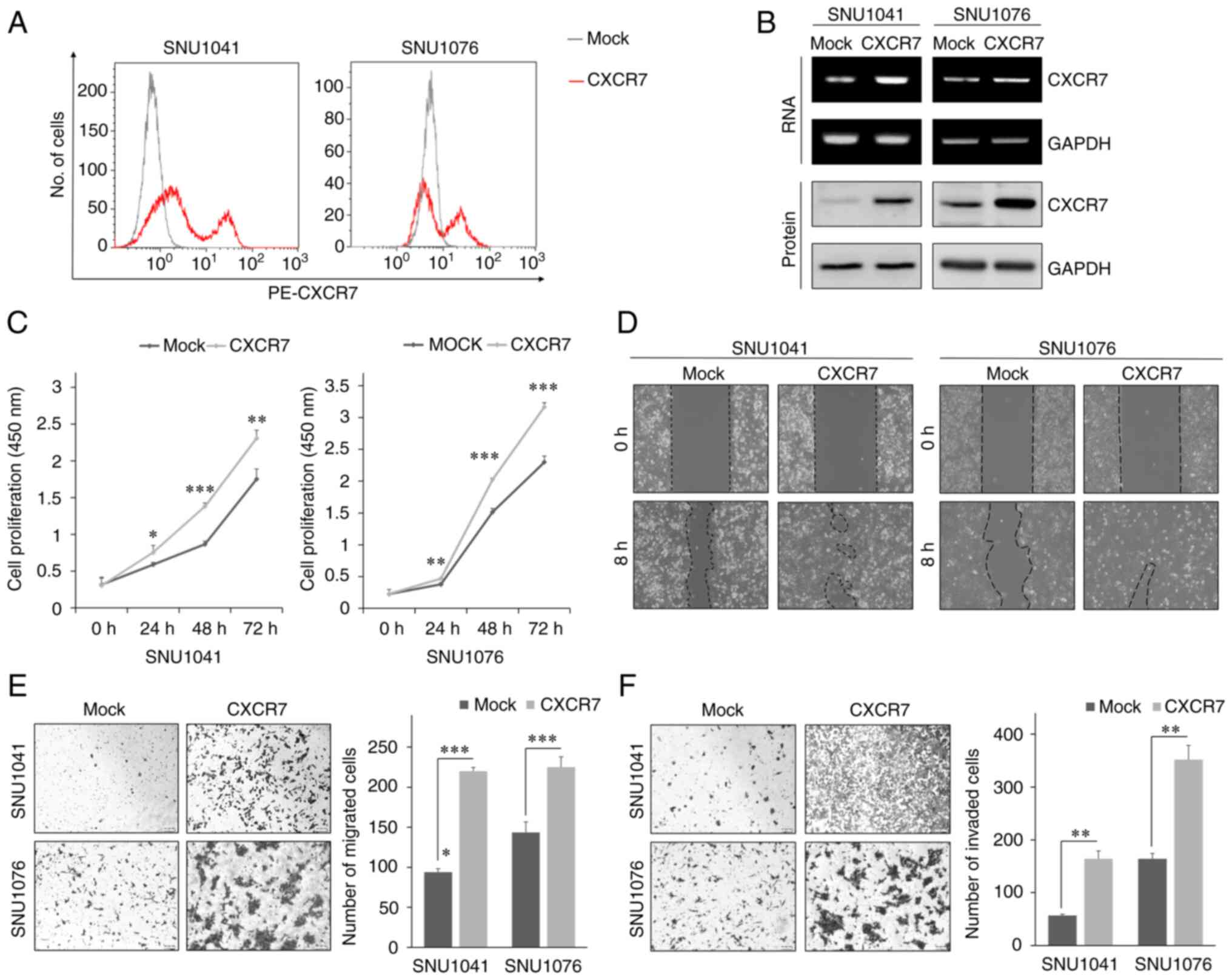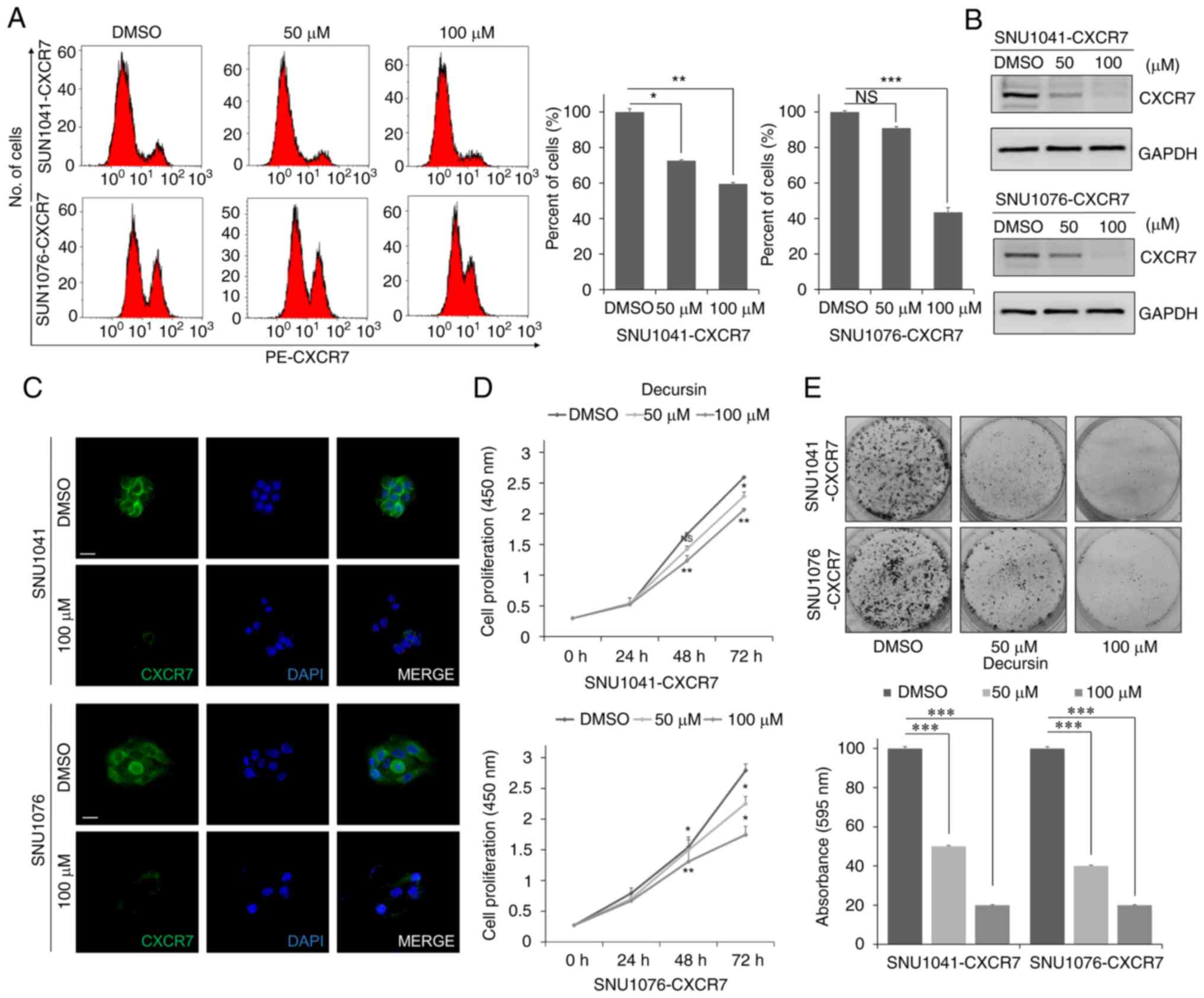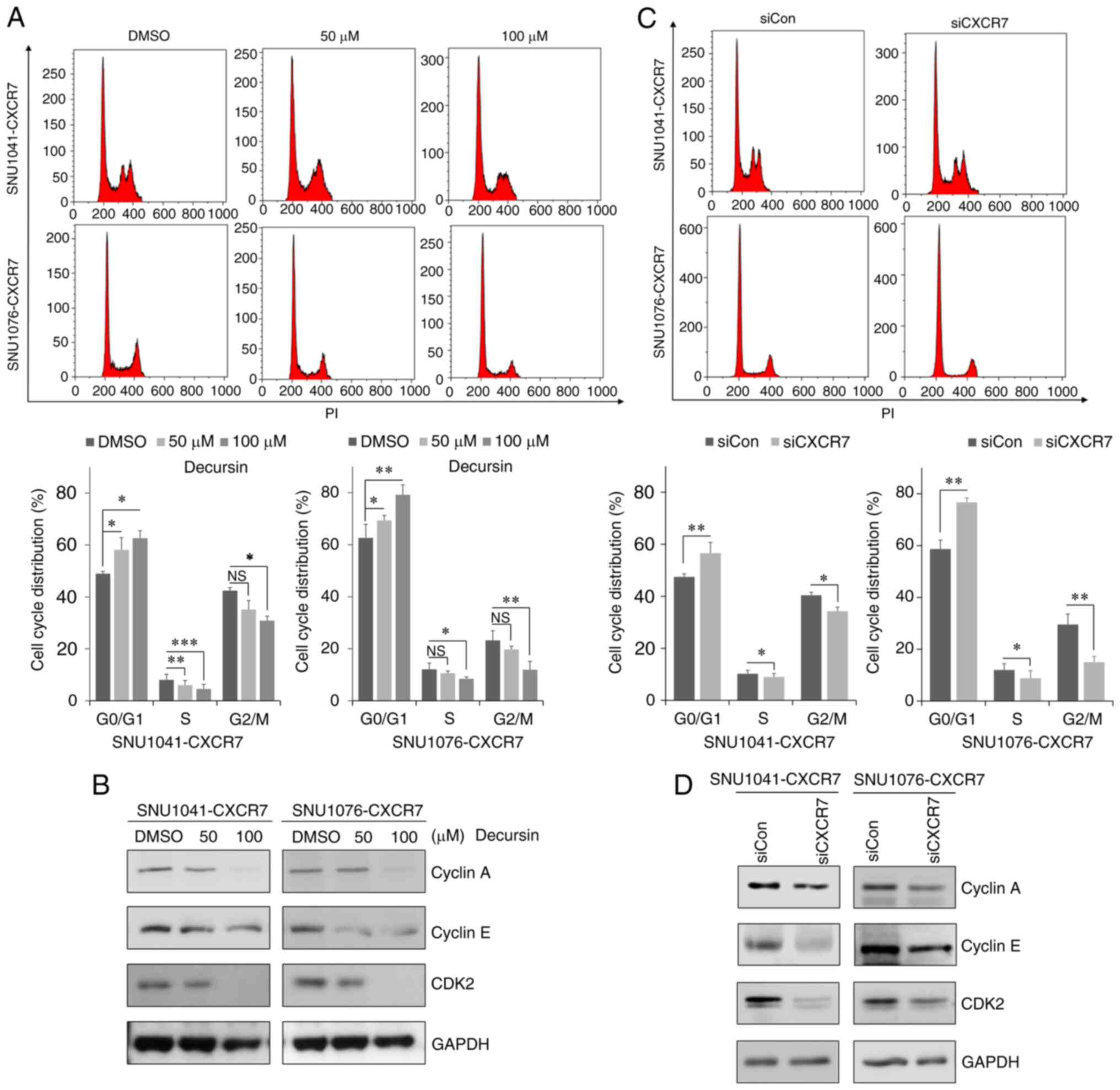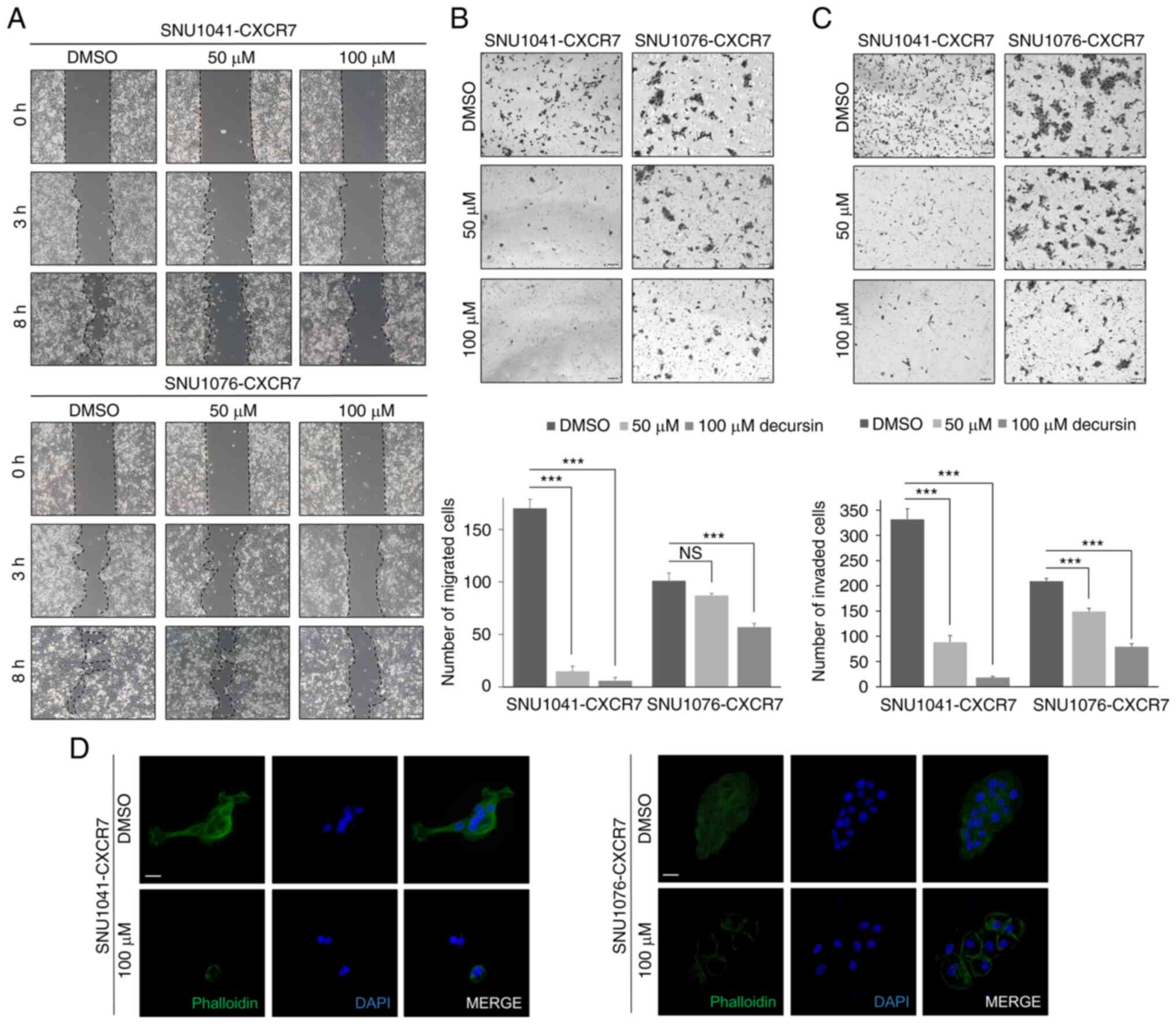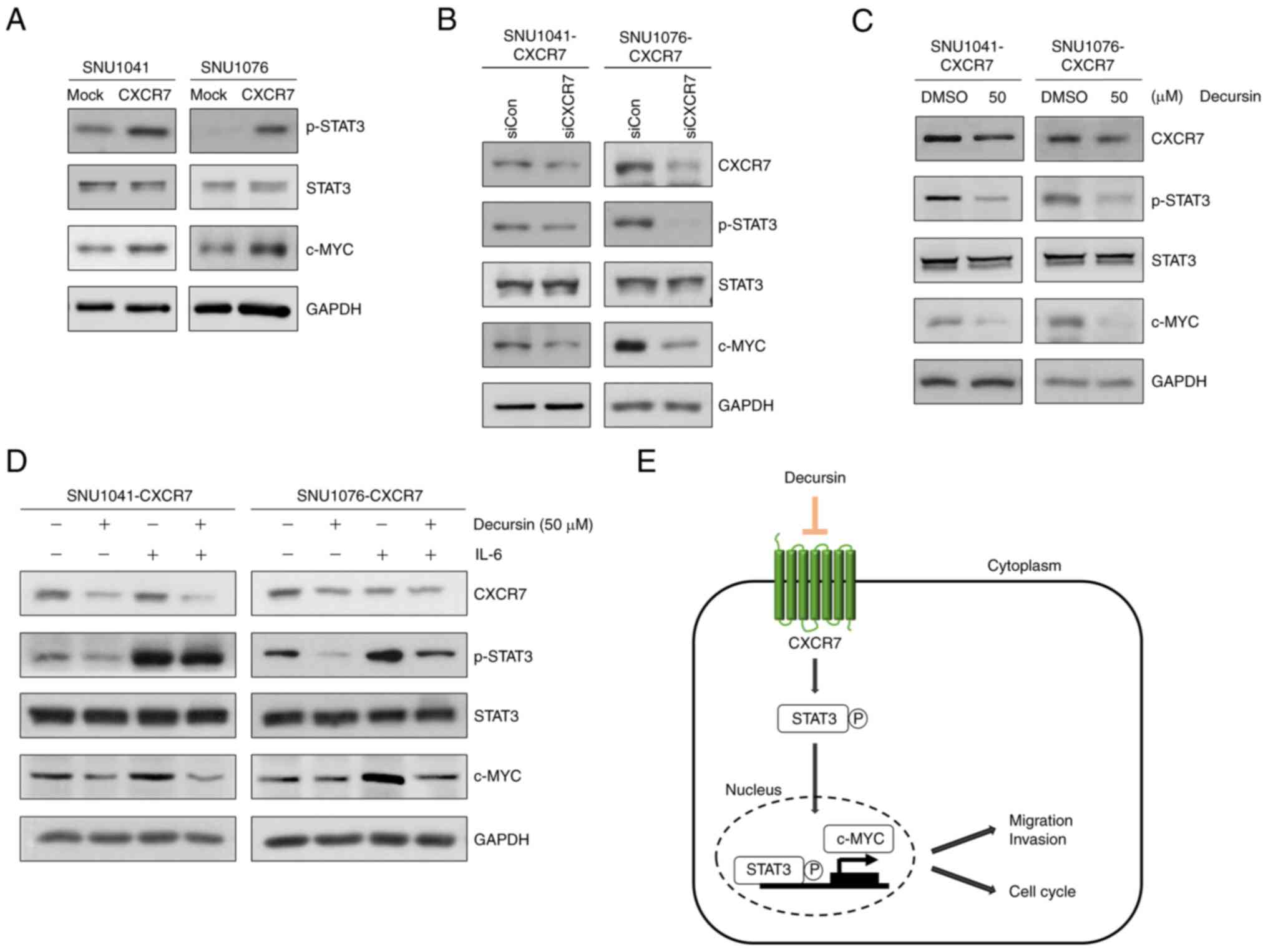|
1
|
Siegel RL, Miller KD and Jemal A: Cancer
statistics, 2018. CA Cancer J Clin. 68:7–30. 2018. View Article : Google Scholar : PubMed/NCBI
|
|
2
|
Solomon B, Young RJ and Rischin D: Head
and neck squamous cell carcinoma: Genomics and emerging biomarkers
for immunomodulatory cancer treatments. Semin Cancer Biol.
52:228–240. 2018. View Article : Google Scholar : PubMed/NCBI
|
|
3
|
Goesswein D, Habtemichael N, Gerhold-Ay A,
Mazur J, Wünsch D, Knauer SK, Künzel J, Matthias C, Strieth S and
Stauber RH: Expressional analysis of disease-relevant
signalling-pathways in primary tumours and metastasis of head and
neck cancers. Sci Rep. 8:73262018. View Article : Google Scholar : PubMed/NCBI
|
|
4
|
Isaacsson Velho PH, Castro G Jr and Chung
CH: Novel targeted agents in head and neck squamous cell carcinoma.
Hematol Oncol Clin North Am. 29:993–1009. 2015. View Article : Google Scholar : PubMed/NCBI
|
|
5
|
Müller A, Homey B, Soto H, Ge N, Catron D,
Buchanan ME, McClanahan T, Murphy E, Yuan W, Wagner SN, et al:
Involvement of chemokine receptors in breast cancer metastasis.
Nature. 410:50–56. 2001. View
Article : Google Scholar : PubMed/NCBI
|
|
6
|
Liotta LA: An attractive force in
metastasis. Nature. 410:24–25. 2001. View
Article : Google Scholar : PubMed/NCBI
|
|
7
|
Zlotnik A: Chemokines in neoplastic
progression. Semin Cancer Biol. 14:181–185. 2004. View Article : Google Scholar : PubMed/NCBI
|
|
8
|
Zlotnik A, Morales J and Hedrick JA:
Recent advances in chemokines and chemokine receptors. Crit Rev
Immunol. 19:1–47. 1999. View Article : Google Scholar : PubMed/NCBI
|
|
9
|
Salazar N, Castellan M, Shirodkar SS and
Lokeshwar BL: Chemokines and chemokine receptors as promoters of
prostate cancer growth and progression. Crit Rev Eukaryot Gene
Expr. 23:77–91. 2013. View Article : Google Scholar : PubMed/NCBI
|
|
10
|
Pierce KL, Premont RT and Lefkowitz RJ:
Seven-transmembrane receptors. Nat Rev Mol Cell Biol. 3:639–650.
2002. View
Article : Google Scholar : PubMed/NCBI
|
|
11
|
Kim N, Ryu H, Kim S, Joo M, Jeon HJ, Lee
MW, Song IC, Kim MN, Kim JM and Lee HJ: CXCR7 promotes migration
and invasion in head and neck squamous cell carcinoma by
upregulating TGF-β1/Smad2/3 signaling. Sci Rep. 9:181002019.
View Article : Google Scholar : PubMed/NCBI
|
|
12
|
Liberman J, Sartelet H, Flahaut M,
Mühlethaler-Mottet A, Coulon A, Nyalendo C, Vassal G, Joseph JM and
Gross N: Involvement of the CXCR7/CXCR4/CXCL12 axis in the
malignant progression of human neuroblastoma. PLoS One.
7:e436652012. View Article : Google Scholar : PubMed/NCBI
|
|
13
|
Wang J, Shiozawa Y, Wang J, Wang Y, Jung
Y, Pienta KJ, Mehra R, Loberg R and Taichman RS: The role of
CXCR7/RDC1 as a chemokine receptor for CXCL12/SDF-1 in prostate
cancer. J Biol Chem. 283:4283–4294. 2008. View Article : Google Scholar : PubMed/NCBI
|
|
14
|
Liu TJ, Guo JL and Xu X: CXC chemokine-7
inhibits growth and migration of oral tongue squamous cell
carcinoma cells, mediated by the epithelial-mesenchymal transition
signaling pathway. Mol Med Rep. 16:6896–6903. 2017. View Article : Google Scholar : PubMed/NCBI
|
|
15
|
Iwakiri S, Mino N, Takahashi T, Sonobe M,
Nagai S, Okubo K, Wada H, Date H and Miyahara R: Higher expression
of chemokine receptor CXCR7 is linked to early and metastatic
recurrence in pathological stage I nonsmall cell lung cancer.
Cancer. 115:2580–2593. 2009. View Article : Google Scholar : PubMed/NCBI
|
|
16
|
Yates TJ, Knapp J, Gosalbez M, Lokeshwar
SD, Gomez CS, Benitez A, Ekwenna OO, Young EE, Manoharan M and
Lokeshwar VB: C-X-C chemokine receptor 7: A functionally associated
molecular marker for bladder cancer. Cancer. 119:61–71. 2013.
View Article : Google Scholar : PubMed/NCBI
|
|
17
|
Wani N, Nasser MW, Ahirwar DK, Zhao H,
Miao Z, Shilo K and Ganju RK: C-X-C motif chemokine 12/C-X-C
chemokine receptor type 7 signaling regulates breast cancer growth
and metastasis by modulating the tumor microenvironment. Breast
Cancer Res. 16:R542014. View
Article : Google Scholar : PubMed/NCBI
|
|
18
|
Yanagiya M, Dawood RI, Maishi N, Hida Y,
Torii C, Annan DA, Kikuchi H, Yanagawa Matsuda A, Kitamura T, Ohiro
Y, et al: Correlation between endothelial CXCR7 expression and
clinicopathological factors in oral squamous cell carcinoma. Pathol
Int. 71:383–391. 2021. View Article : Google Scholar : PubMed/NCBI
|
|
19
|
Schrevel M, Karim R, ter Haar NT, van der
Burg SH, Trimbos JB, Fleuren GJ, Gorter A and Jordanova ES: CXCR7
expression is associated with disease-free and disease-specific
survival in cervical cancer patients. Br J Cancer. 106:1520–1525.
2012. View Article : Google Scholar : PubMed/NCBI
|
|
20
|
Jiang C, Guo J, Wang Z, Xiao B, Lee HJ,
Lee EO, Kim SH and Lu J: Decursin and decursinol angelate inhibit
estrogen-stimulated and estrogen-independent growth and survival of
breast cancer cells. Breast Cancer Res. 9:R772007. View Article : Google Scholar : PubMed/NCBI
|
|
21
|
Kim SH, Lee SW, Park HJ, Lee SH, Im WK,
Kim YD, Kim KH, Park SJ, Hong S and Jeon SH: Anti-cancer activity
of Angelica gigas by increasing immune response and
stimulating natural killer and natural killer T cells. BMC
Complement Altern Med. 18:2182018. View Article : Google Scholar : PubMed/NCBI
|
|
22
|
Kim S, Kim JE, Kim N, Joo M, Lee MW, Jeon
HJ, Ryu H, Song IC, Song GY and Lee HJ: Decursin inhibits tumor
growth, migration, and invasion in gastric cancer by
down-regulating CXCR7 expression. Am J Cancer Res. 9:2007–2018.
2019.PubMed/NCBI
|
|
23
|
Lee S, Shin DS, Kim JS, Oh KB and Kang SS:
Antibacterial coumarins from Angelica gigas roots. Arch
Pharm Res. 26:449–452. 2003. View Article : Google Scholar : PubMed/NCBI
|
|
24
|
Son SH, Kim MJ, Chung WY, Son JA, Kim YS,
Kim YC, Kang SS, Lee SK and Park KK: Decursin and decursinol
inhibit VEGF-induced angiogenesis by blocking the activation of
extracellular signal-regulated kinase and c-Jun N-terminal kinase.
Cancer Lett. 280:86–92. 2009. View Article : Google Scholar : PubMed/NCBI
|
|
25
|
Yim D, Singh RP, Agarwal C, Lee S, Chi H
and Agarwal R: A novel anticancer agent, decursin, induces G1
arrest and apoptosis in human prostate carcinoma cells. Cancer Res.
65:1035–1044. 2005.PubMed/NCBI
|
|
26
|
Lee JH, Kim MA, Park S, Cho SH, Yun E, O
YS, Kim J, Goo JI, Yun MY, Choi Y, et al: Synthesis and evaluation
of (+)-decursin derivatives as inhibitors of the Wnt/β-catenin
pathway. Bioorg Med Chem Lett. 26:3529–3532. 2016. View Article : Google Scholar : PubMed/NCBI
|
|
27
|
Kim WJ, Lee SJ, Choi YD and Moon SK:
Decursin inhibits growth of human bladder and colon cancer cells
via apoptosis, G1-phase cell cycle arrest and extracellular
signal-regulated kinase activation. Int J Mol Med. 25:635–641.
2010.PubMed/NCBI
|
|
28
|
Oh ST, Lee S, Hua C, Koo BS, Pak SC, Kim
DI, Jeon S and Shin BA: Decursin induces apoptosis in glioblastoma
cells, but not in glial cells via a mitochondria-related caspase
pathway. Korean J Physiol Pharmacol. 23:29–35. 2019. View Article : Google Scholar : PubMed/NCBI
|
|
29
|
Tang Z, Li C, Kang B, Gao G, Li C and
Zhang Z: GEPIA: A web server for cancer and normal gene expression
profiling and interactive analyses. Nucleic Acids Res. 45:W98–W102.
2017. View Article : Google Scholar : PubMed/NCBI
|
|
30
|
Longley DB, Harkin DP and Johnston PG:
5-fluorouracil: Mechanisms of action and clinical strategies. Nat
Rev Cancer. 3:330–338. 2003. View Article : Google Scholar : PubMed/NCBI
|
|
31
|
de Oliveira Júnior RG, Christiane Adrielly
AF, da Silva Almeida JR, Grougnet R, Thiéry V and Picot L:
Sensitization of tumor cells to chemotherapy by natural products: A
systematic review of preclinical data and molecular mechanisms.
Fitoterapia. 129:383–400. 2018. View Article : Google Scholar : PubMed/NCBI
|
|
32
|
Yim NH, Lee JH, Cho WK, Yang MC, Kwak DH
and Ma JY: Decursin and decursinol angelate from Angelica
gigas Nakai induce apoptosis via induction of TRAIL expression
on cervical cancer cells. Eur J Integr Med. 3:e299–e307. 2011.
View Article : Google Scholar
|
|
33
|
Liao YX, Zhou CH, Zeng H, Zuo DQ, Wang ZY,
Yin F, Hua YQ and Cai ZD: The role of the CXCL12-CXCR4/CXCR7 axis
in the progression and metastasis of bone sarcomas (Review). Int J
Mol Med. 32:1239–1246. 2013. View Article : Google Scholar : PubMed/NCBI
|
|
34
|
Lin L, Han MM, Wang F, Xu LL, Yu HX and
Yang PY: CXCR7 stimulates MAPK signaling to regulate hepatocellular
carcinoma progression. Cell Death Dis. 5:e14882014. View Article : Google Scholar : PubMed/NCBI
|
|
35
|
Wang Y, Xu P, Qiu L, Zhang M, Huang Y and
Zheng JC: CXCR7 participates in CXCL12-mediated cell cycle and
proliferation regulation in mouse neural progenitor cells. Curr Mol
Med. 16:738–746. 2016. View Article : Google Scholar : PubMed/NCBI
|
|
36
|
Salazar N, Muñoz D, Kallifatidis G, Singh
RK, Jordà M and Lokeshwar BL: The chemokine receptor CXCR7
interacts with EGFR to promote breast cancer cell proliferation.
Mol Cancer. 13:1982014. View Article : Google Scholar : PubMed/NCBI
|
|
37
|
Duda DG, Kozin SV, Kirkpatrick ND, Xu L,
Fukumura D and Jain RK: CXCL12 (SDF1α)-CXCR4/CXCR7 pathway
inhibition: An emerging sensitizer for anticancer therapies? Clin
Cancer Res. 17:2074–2080. 2011. View Article : Google Scholar : PubMed/NCBI
|
|
38
|
Sun X, Cheng G, Hao M, Zheng J, Zhou X,
Zhang J, Taichman RS, Pienta KJ and Wang J: CXCL12/CXCR4/CXCR7
chemokine axis and cancer progression. Cancer Metastasis Rev.
29:709–722. 2010. View Article : Google Scholar : PubMed/NCBI
|
|
39
|
Kojima Y, Acar A, Eaton EN, Mellody KT,
Scheel C, Ben-Porath I, Onder TT, Wang ZC and Richardson AL:
Autocrine TGF-beta and stromal cell-derived factor-1 (SDF-1)
signaling drives the evolution of tumor-promoting mammary stromal
myofibroblasts. Proc Natl Acad Sci USA. 107:20009–20014. 2010.
View Article : Google Scholar : PubMed/NCBI
|
|
40
|
Barbieri F, Bajetto A, Pattarozzi A, Gatti
M, Würth R, Porcile C, Thellung S, Corsaro A, Villa V, Nizzari M
and Florio T: The Chemokine SDF1/CXCL12: A novel
autocrine/paracrine factor involved in pituitary adenoma
development. The Open Neuroendocrinol J. 4:64–76. 2011. View Article : Google Scholar
|
|
41
|
Kamran MZ, Patil P and Gude RP: Role of
STAT3 in cancer metastasis and translational advances. Biomed Res
Int. 2013:4218212013. View Article : Google Scholar : PubMed/NCBI
|
|
42
|
Corvinus FM, Orth C, Moriggl R, Tsareva
SA, Wagner S, Pfitzner EB, Baus D, Kaufmann R, Huber LA, Zatloukal
K, et al: Persistent STAT3 activation in colon cancer is associated
with enhanced cell proliferation and tumor growth. Neoplasia.
7:545–555. 2005. View Article : Google Scholar : PubMed/NCBI
|
|
43
|
Kim DY, Cha ST, Ahn DH, Kang HY, Kwon CI,
Ko KH, Hwang SG, Park PW, Rim KS and Hong SP: STAT3 expression in
gastric cancer indicates a poor prognosis. J Gastroenterol Hepatol.
24:646–651. 2009. View Article : Google Scholar : PubMed/NCBI
|
|
44
|
Morgan EL and Macdonald A: Autocrine STAT3
activation in HPV positive cervical cancer through a virus-driven
Rac1-NFκB-IL-6 signalling axis. PLoS Pathog. 15:e10078352019.
View Article : Google Scholar : PubMed/NCBI
|
|
45
|
Lee C and Cheung ST: STAT3: An emerging
therapeutic target for hepatocellular carcinoma. Cancers (Basel).
11:2019. View Article : Google Scholar
|
|
46
|
Sukanya Dimri S and De A: Approaching
non-canonical STAT3 signaling to redefine cancer therapeutic
strategy. Integr Mol Med. 4:2017.
|
|
47
|
Kusaba T, Nakayama T, Yamazumi K, Yakata
Y, Yoshizaki A, Inoue K, Nagayasu T and Sekine I: Activation of
STAT3 is a marker of poor prognosis in human colorectal cancer.
Oncol Rep. 15:1445–1451. 2006.PubMed/NCBI
|
|
48
|
Bartek J and Lukas J: Mammalian G1- and
S-phase checkpoints in response to DNA damage. Curr Opin Cell Biol.
13:738–747. 2001. View Article : Google Scholar : PubMed/NCBI
|
|
49
|
Chai EZ, Shanmugam MK, Arfuso F,
Dharmarajan A, Wang C, Kumar AP, Samy RP, Lim LH, Wang L, Goh BC,
et al: Targeting transcription factor STAT3 for cancer prevention
and therapy. Pharmacol Ther. 162:86–97. 2016. View Article : Google Scholar : PubMed/NCBI
|
|
50
|
Im JY, Kim BK, Lee KW, Chun SY, Kang MJ
and Won M: DDIAS promotes STAT3 activation by preventing STAT3
recruitment to PTPRM in lung cancer cells. Oncogenesis. 9:12020.
View Article : Google Scholar : PubMed/NCBI
|
|
51
|
Tolomeo M and Cascio A: The multifaced
role of STAT3 in cancer and its implication for anticancer therapy.
Int J Mol Sci. 22:6032021. View Article : Google Scholar : PubMed/NCBI
|
|
52
|
Schaub FX, Dhankani V, Berger AC, Trivedi
M, Richardson AB, Shaw R, Zhao W, Zhang X, Ventura A, Liu Y, et al:
Pan-cancer alterations of the MYC oncogene and its proximal network
across the cancer genome atlas. Cell Syst. 6:282–300.e282. 2018.
View Article : Google Scholar : PubMed/NCBI
|
|
53
|
Yu CY, Wang L, Khaletskiy A, Farrar WL,
Larner A, Colburn NH and Li JJ: STAT3 activation is required for
interleukin-6 induced transformation in tumor-promotion sensitive
mouse skin epithelial cells. Oncogene. 21:3949–3960. 2002.
View Article : Google Scholar : PubMed/NCBI
|
|
54
|
Wang SW and Sun YM: The IL-6/JAK/STAT3
pathway: Potential therapeutic strategies in treating colorectal
cancer (Review). Int J Oncol. 44:1032–1040. 2014. View Article : Google Scholar : PubMed/NCBI
|
|
55
|
Aryappalli P, Al-Qubaisi SS, Attoub S,
George JA, Arafat K, Ramadi KB, Mohamed YA, Al-Dhaheri MM, Al-Sbiei
A, Fernandez-Cabezudo MJ and Al-Ramadi BK: The IL-6/STAT3 signaling
pathway is an early target of manuka honey-induced suppression of
human breast cancer cells. Front Oncol. 7:1672017. View Article : Google Scholar : PubMed/NCBI
|
|
56
|
Zou S, Tong Q, Liu B, Huang W, Tian Y and
Fu X: Targeting STAT3 in cancer immunotherapy. Mol Cancer.
19:1452020. View Article : Google Scholar : PubMed/NCBI
|
|
57
|
Arantes-Rodrigues R, Colaço A, Pinto-Leite
R and Oliveira PA: In vitro and in vivo experimental models as
tools to investigate the efficacy of antineoplastic drugs on
urinary bladder cancer. Anticancer Res. 33:1273–1296.
2013.PubMed/NCBI
|
|
58
|
Varley CL and Southgate J: Organotypic and
3D reconstructed cultures of the human bladder and urinary tract.
Methods Mol Biol. 695:197–211. 2011. View Article : Google Scholar : PubMed/NCBI
|















